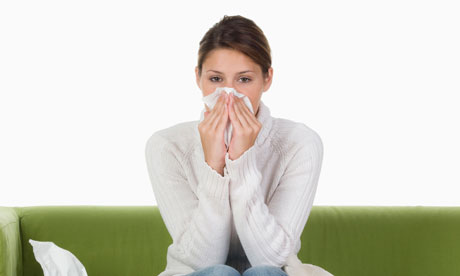
The dilemma
Your head feels as if it's made of chewing gum, your nose is dripping like a broken tap and someone has rubbed sandpaper down the back of your throat. You've got a cold – the first of between two and five that you're likely to get this year. You curse that man at work who sneezed all over you in the lift the other day. If your toddler catches this cold you'll get no sleep for a week. Don't people with colds realise they should keep them to themselves? But what do you do? Do you stay at home to stop others catching it, or head to work because you've got an important meeting and you don't want your colleagues to have to cover for you?
The solution
Colds are caused by viruses and last on average seven days, usually causing symptoms such as a runny nose, cough, loss of appetite, tiredness and, occasionally, a slight fever. Professor Ronald Eccles, director of the Common Cold Centre at Cardiff University says that it's fine to go into work if you feel well enough. "If people didn't go into work when they had colds, the UK economy would grind to a halt over winter," he says. It isn't selfish to take your cold to work with you because most colds, he points out, are caught at home, where we spend hours huddled up to each other on the sofa and in bed. Colds are so ubiquitous you can't escape them and if you are exposed to a cold virus it doesn't mean you will inevitably catch it.
But you are likely to be less productive at work – so if possible avoid jobs that need mental or manual effort for the first couple of days of your cold. If you work with elderly people or young children you need to assess the risk more thoroughly – although both groups will be exposed to colds from many sources. And stay away from anyone who has a chronic respiratory problem or who is on chemotherapy – for them a cold virus can be seriously harmful. Be hygienic at work too – cough and sneeze into tissues and wash your hands often and thoroughly. You are most infectious when you have the early symptoms of coughing, sneezing and a dripping nose.
(Eccles says we should send our children to school with colds too, if they feel well enough to go and don't have a fever.) Eccles' studies in Cardiff show that out of 1,000 people with colds, only a couple will have a fever. If you do get one, or feel dizzy or unwell, then you should rest for a day and not go into work. For some people who are self-employed or worried about job security this may not be an option, in which case you should drink soothing cups of hot water, lemon and honey and have a nice steam when you get home (stick your head over a bowl of hot water with a bit of Olbas oil in it, put a towel over your head and the bowl, and inhale) as well as an early night.

